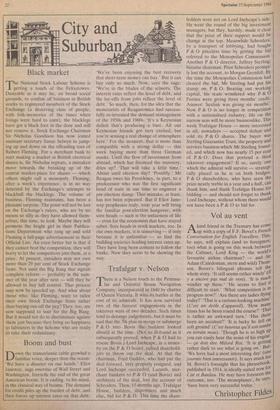I II
City and
Black market
The National Stock Labour Scheme is getting a touch of the Felixstowes. Desirable as it may be, on broad social grounds, to confine all business in British stocks to registered members of the Stock Exchange (a deserving class of people, with folk-memories of the times when livings were hard to earn), the blacklegs have got a black foot in the door and will not remove it. Stock Exchange Chairman Sir Nicholas Goodison has now joined assistant secretary Susan Selwyn in jump- ing up and down on the offending toes of Robert Fleming. For a merchant bank to start making a market in British electrical shares is, Sir Nicholas repeats, a mistaken move towards the breaking up of the central market-place for shares — which others might call a monopoly. Fleming, after a week's experience, is in no way deterred by the Exchange's attempts to blackball the blacklegs. The volume of business, Fleming maintains, has been a pleasant surprise. The point will not be lost on the Exchange's rulers, who are by no means so silly as they have allowed them- selves, this time, to look. Maybe they will promote the bright girl in their Publica- tions Department who rang up and sold Fleming a full-page advertisement in their Official List. An even better bet is that if they cannot beat the competition, they will hurry to let the competitors join them, at a price. At present, outsiders may not own more than 29 per cent of Stock Exchange firms. Not until the Big Bang that signals complete reform — probably in the sum- mer of the year after next — will they be allowed to buy full control. That process may now be speeded up. And what about those who, like Fleming, want to tailor their own Stock Exchange firms rather than buying one off the peg? They, too, are now supposed to wait for the Big Bang. But it would not do to discriminate against them just because they bring no happiness to labourers in the Scheme who are ready to take their redundancy.


















































 Previous page
Previous page